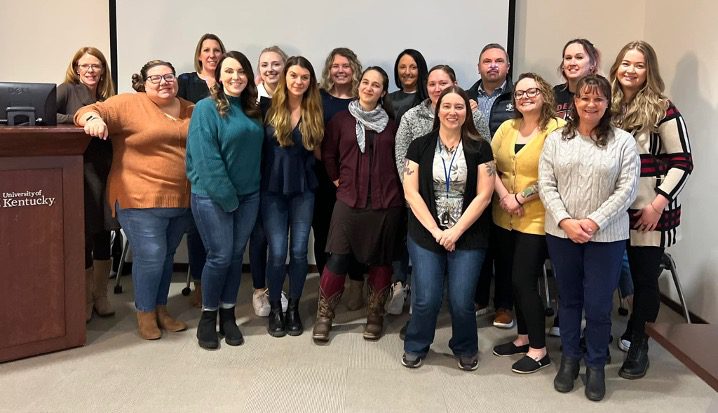Supporting Women in the Carceral System: Working With Community Partners to Best Understand the Needs of JCOIN Study Populations
 The University of Kentucky Clinical Research Center (Kentucky Hub) of the NIH/NIDA-funded Justice Community Opioid Innovation Network (JCOIN) is the only Hub nationally to focus exclusively on women. The overall aim of the project is to increase access to medications to treat opioid use disorder (MOUD) among justice-involved women through telehealth linkages with community providers prior to release. While the Kentucky Hub is focused on women, the research team understands that their participants may live at the intersection of many marginalized statuses. This allows them to focus their equity, diversity, and inclusivity (EDI) best practice efforts on ways to better anticipate needs, barriers, and concerns from women – both in general, as well as how different backgrounds may affect those experiences.
The University of Kentucky Clinical Research Center (Kentucky Hub) of the NIH/NIDA-funded Justice Community Opioid Innovation Network (JCOIN) is the only Hub nationally to focus exclusively on women. The overall aim of the project is to increase access to medications to treat opioid use disorder (MOUD) among justice-involved women through telehealth linkages with community providers prior to release. While the Kentucky Hub is focused on women, the research team understands that their participants may live at the intersection of many marginalized statuses. This allows them to focus their equity, diversity, and inclusivity (EDI) best practice efforts on ways to better anticipate needs, barriers, and concerns from women – both in general, as well as how different backgrounds may affect those experiences.
The Kentucky Hub worked with their local Community Advisory Board (CAB) to further ensure the EDI principles were integrated within the research design, study measures, and study implementation of their JCOIN project. The CAB is a group of 10-12 individuals convened for the purpose of 1) providing a forum for people who use drugs to consider ethical and practical issues of proposed research, and 2) involving people who use drugs in the development, design, and dissemination of research. Board members are compensated for their time, and meetings take place monthly. Membership in the CAB is balanced with representation by gender, age, race/ethnicity, geography, and rural/urban status.
The Kentucky Hub’s work with the CAB initially was focused on study design and measurement. The team wanted to ensure that they were incorporating all the unique factors associated with treatment entry. Findings from the first meeting with the full CAB suggested the following primary themes:
- Stigma, shame, guilt – major barriers that prevent women from entering treatment
- Children and parenting – lack of childcare to enter treatment
- Social support – women often lack the supportive network after release from jail to enter treatment
- Diversity – not all populations of women may get treated equally in treatment (examples include race/ethnicity, sexual/gender orientation, SES)
These themes led to additional discussion and conceptualization by the team to better understand some of the unique issues among women from different backgrounds. As a follow-up, the Kentucky Hub requested to target their next conversation with just the women members of the CAB with a focus on supports, facilitating factors, and possible solutions. Through JCOIN, the Kentucky Hub hopes to remove barriers and mitigate challenges to treatment, but also to foster and grow those factors that will support treatment access. They also wanted to better understand barriers to treatment for marginalized populations.
A second women-only CAB meeting for the Kentucky Hub is being planned in the upcoming weeks to provide will a develop a qualitative interview guide that can be used with women who complete the JCOIN study. The overall goal of the qualitative interview guide is to give women from different backgrounds and experiences a voice to help the research team understand the barriers and facilitating factors associated with entering MOUD treatment.
These questions will be asked of women as they complete their 12 month follow-up after jail release to wrap up study participation. The Kentucky Hub recognizes that it is critical to hear from women about the barriers that exist at the individual and systems level that prevent MOUD utilization. The Kentucky Hub is interested in better understanding how to remove barriers for women using life-saving medication to treat their opioid use disorder.
Working with the CAB has been a tremendous opportunity for the Kentucky Hub to better understand women’s experiences – as understood and described by individuals with lived experience. They understand the limitations of the system. They understand the individual level barriers that limit people’s opportunities for treatment. They understand the subtle nuances of an experience that we may miss because we are not looking for it. The CAB has helped the Kentucky Hub to realize that work they are doing is important, and we need to listen to the voices of women who may change and shape our perspectives to increase opportunities to help women access desperately needed treatment and avoid reincarceration.

